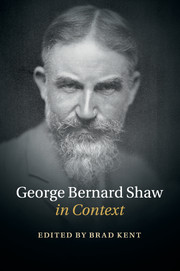Book contents
- Frontmatter
- Dedication
- Contents
- List of illustrations
- Notes on contributors
- Preface
- Acknowledgements
- A Chronology of Shaw's Works
- List of abbreviations
- PART I PEOPLE AND PLACES
- PART II THEATRE
- PART III WRITING AND THE ARTS
- 15 Cinema
- 16 Journalism
- 17 Letters
- 18 Media and technology
- 19 Modernism
- 20 Music
- 21 Novels
- 22 Publishers and publishing
- 23 Visual arts
- PART IV POLITICS
- PART V CULTURE AND SOCIETY
- PART VI RECEPTION AND AFTERLIFE
- Further reading
- Index
- References
15 - Cinema
from PART III - WRITING AND THE ARTS
Published online by Cambridge University Press: 05 October 2015
- Frontmatter
- Dedication
- Contents
- List of illustrations
- Notes on contributors
- Preface
- Acknowledgements
- A Chronology of Shaw's Works
- List of abbreviations
- PART I PEOPLE AND PLACES
- PART II THEATRE
- PART III WRITING AND THE ARTS
- 15 Cinema
- 16 Journalism
- 17 Letters
- 18 Media and technology
- 19 Modernism
- 20 Music
- 21 Novels
- 22 Publishers and publishing
- 23 Visual arts
- PART IV POLITICS
- PART V CULTURE AND SOCIETY
- PART VI RECEPTION AND AFTERLIFE
- Further reading
- Index
- References
Summary
The relationship between Shaw and film might well be described as a long, often frustrated, ultimately inconclusive courtship. Shaw was a futurist by habit as well as conviction, and he was interested in films from their very beginning at the turn of the twentieth century. Shaw, the master of verbal communication, thought Charlie Chaplin, the master of non-verbal communication, was a great artist. Then the introduction of sound, with the The Jazz Singer in 1927, led him to believe that films could now take the place of stage drama to some extent. However, the first film adaptations of his plays, made with varying degrees of faithfulness to the texts and of his participation, did not please him, even when, as in the case of German and Dutch versions of Pygmalion, they proved to be popular.
His education in the movie business had followed a familiar course for writers. He had discovered that studio-hired writers were unlikely to turn out what he considered successful adaptations, so he began writing his own screenplays, which did take advantage of film's inherent advantages and techniques. However, once the films were in production, the screenplays were altered, unwisely and without his permission, and sometimes in defiance of the contracts he had signed with the companies. His experiences were validating an emerging truism about motion pictures: if live theatre could be described as ultimately a writer's medium, film, at that time, had to be called a producer's medium. In the mid 1930s, then, Shaw was searching for a producer, one who would ‘know good work from bad … and didn't prefer the bad’.
He had already decided on his own approach to and ambition for drama on film. For instance, he could define precisely why he did not like Hollywood movies: they were abusing cinema, which he believed would have a cultural impact as large as the invention of printing. He recognised their technical superiority, and marvelled at their free spending, but he had no patience with their ‘children's picture book stories’. To him, it was as if they asked the hotel bellboy to turn out their scripts: ‘The bellboy's vision of life is a continual arriving in motor-cars and going upstairs and disappearing through doors that immediately close and leave life a blank … My plays do not depend on staircases for their interest’.
Information
- Type
- Chapter
- Information
- George Bernard Shaw in Context , pp. 119 - 126Publisher: Cambridge University PressPrint publication year: 2015
References
Accessibility standard: Unknown
Why this information is here
This section outlines the accessibility features of this content - including support for screen readers, full keyboard navigation and high-contrast display options. This may not be relevant for you.Accessibility Information
- 1
- Cited by
